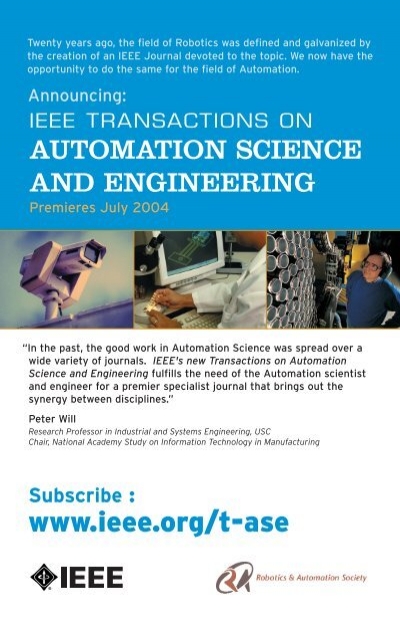Surrogate-Assisted Scenario-Generation Method for Simulation-Based Stochastic Programming Problems
IF 6.4
2区 计算机科学
Q1 AUTOMATION & CONTROL SYSTEMS
IEEE Transactions on Automation Science and Engineering
Pub Date : 2025-03-17
DOI:10.1109/TASE.2025.3551716
引用次数: 0
Abstract
Simulation is required in real-world industrial decision-making to model the complexity, such as supply chain management with uncertain future demand. Scenario generation is critical for handling inherent uncertainties as deterministic scenarios to solve stochastic programming problems (SPPs). Generating a minimal yet representative scenario set is important to solve simulation-based SPPs (SBSPPs) since SBSPPs require thousands of simulation iterations proportional to the number of scenarios, leading to significant computational time. However, conventional methods, such as Monte Carlo method and recent problem-driven approaches, are ineffective in solving SBSPPs due to time-consuming simulation evaluation. This paper proposes a surrogate-assisted scenario-generation method called Inferred Cost-Space Scenario Clustering (ICSSC) that is applicable to various SPPs including SBSPPs. ICSSC employs a scenario clustering based on a new cost-space scenario distance evaluated by the surrogate model trained with offline simulation data to quickly approximate simulation evaluations. We conducted three types of numerical experiments to validate the effectiveness: Markowitz portfolio optimization, stochastic server location, and inventory placement optimization. Empirical results revealed that ICSSC could generate an effective scenario set based on the impact of uncertainties on decision outcomes for broader SPPs, and yields better solutions with 7.2 times shorter runtime than Monte Carlo methods. Note to Practitioners—This paper introduces a scenario-generation method to reduce the computational time of simulation-based optimization under uncertainty. Such optimization problems are common in practical decision-making contexts like production planning and supply chain management, which often require highly optimized and resilient solutions. Conventional methods, such as Monte Carlo method, demand extensive computational resources due to evaluating numerous randomly sampled scenarios. This study addresses scenarios in which similar problems are solved iteratively, a common occurrence in practical applications. Our method uses a surrogate model to approximate simulation evaluations quickly and selects a set of representative scenarios on the basis of the impact of uncertainties on decision outcomes. Numerical experiments demonstrated that our method could generate representative scenarios that obtain more robust and optimal solutions with shorter calculation times than conventional methods.基于仿真的随机规划问题的代理辅助场景生成方法
在现实世界的工业决策中,需要仿真来模拟复杂性,例如具有不确定未来需求的供应链管理。场景生成是解决随机规划问题时将固有不确定性作为确定性场景处理的关键。生成最小但具有代表性的场景集对于解决基于模拟的spp (sbspp)非常重要,因为sbspp需要数千次与场景数量成比例的模拟迭代,从而导致大量的计算时间。然而,传统的方法,如蒙特卡罗方法和最近的问题驱动方法,由于耗时的模拟评估,在求解sbspp方面是无效的。本文提出了一种适用于包括sbspp在内的各种spp的代理辅助场景生成方法,称为推断成本空间场景聚类(ICSSC)。ICSSC采用基于离线仿真数据训练的代理模型评估的新成本空间场景距离的场景聚类来快速逼近仿真评估。我们通过三种类型的数值实验来验证其有效性:马科维茨投资组合优化、随机服务器位置和库存放置优化。实证结果表明,ICSSC可以基于不确定性对更广泛spp决策结果的影响生成有效的情景集,并且比蒙特卡罗方法的运行时间缩短7.2倍。从业人员注意:本文介绍了一种场景生成方法,以减少不确定情况下基于模拟的优化计算时间。这种优化问题在生产计划和供应链管理等实际决策环境中很常见,通常需要高度优化和弹性的解决方案。传统的方法,如蒙特卡罗方法,由于评估大量随机采样的场景,需要大量的计算资源。本研究解决了类似问题迭代求解的场景,这在实际应用中很常见。我们的方法使用代理模型来快速近似模拟评估,并根据不确定性对决策结果的影响选择一组具有代表性的场景。数值实验表明,与传统方法相比,该方法可以生成具有代表性的场景,在较短的计算时间内获得更强的鲁棒性和最优解。
本文章由计算机程序翻译,如有差异,请以英文原文为准。
求助全文
约1分钟内获得全文
求助全文
来源期刊

IEEE Transactions on Automation Science and Engineering
工程技术-自动化与控制系统
CiteScore
12.50
自引率
14.30%
发文量
404
审稿时长
3.0 months
期刊介绍:
The IEEE Transactions on Automation Science and Engineering (T-ASE) publishes fundamental papers on Automation, emphasizing scientific results that advance efficiency, quality, productivity, and reliability. T-ASE encourages interdisciplinary approaches from computer science, control systems, electrical engineering, mathematics, mechanical engineering, operations research, and other fields. T-ASE welcomes results relevant to industries such as agriculture, biotechnology, healthcare, home automation, maintenance, manufacturing, pharmaceuticals, retail, security, service, supply chains, and transportation. T-ASE addresses a research community willing to integrate knowledge across disciplines and industries. For this purpose, each paper includes a Note to Practitioners that summarizes how its results can be applied or how they might be extended to apply in practice.
 求助内容:
求助内容: 应助结果提醒方式:
应助结果提醒方式:


